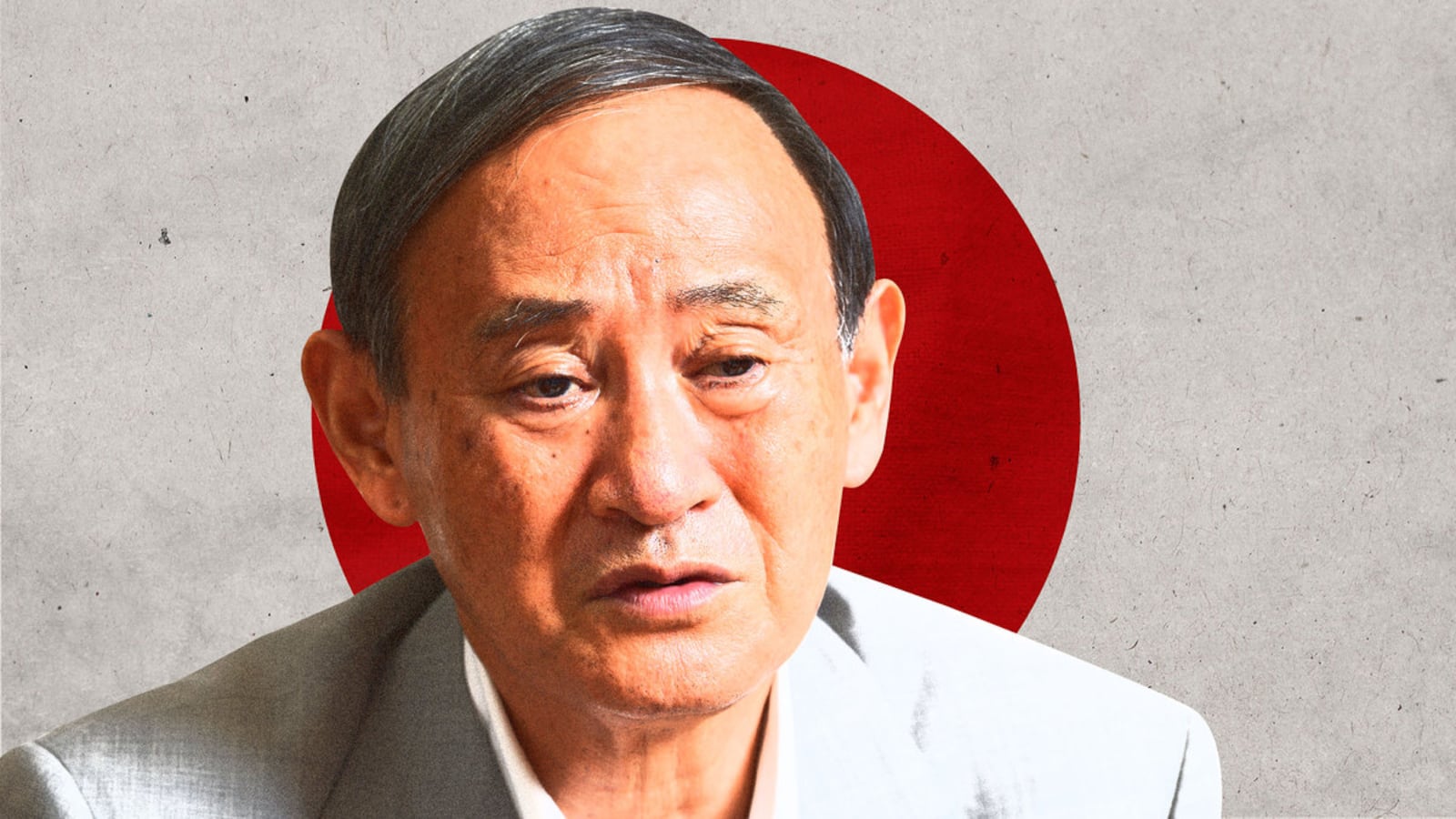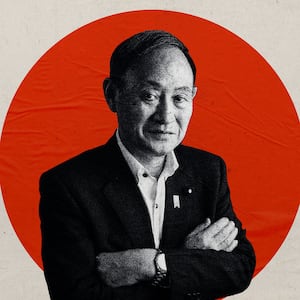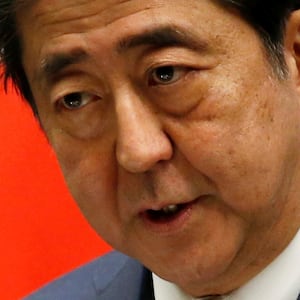TOKYO—Prime Minister Yoshihide Suga won the hearts of Japan with the story of his upbringing as the son of a poor (not really) strawberry farmer in the cold regions of Japan. But if the Japanese public were giving grades to their leader right now, he would be flunking out. His hubris in flatly rejecting academics who were appointed to Japan’s Science Council has angered a nation in which academic freedom is taken seriously—and then he compounded matters by stubbornly promoting a domestic travel program in the middle of the pandemic.
In his first 100 days, he’s gone from valedictorian to class clown. His approval rates have plummeted from 70 percent to as low as 38 percent and the number of people who don’t support him has surpassed the number of people who did. A rating of 39 percent would be a fail in Japan’s educational system, by the way. How did Suga accomplish this abysmal result and where did he go wrong? The Daily Beast has the report card.
Such a Promising Student
On Sept. 16, in a backdoor deal within Japan’s ruling party, the Liberal Democratic Power (LDP), Suga became prime minister after his predecessor, Shinzo Abe, stepped down. Abe was Japan’s longest-serving prime minister and, for his entire time in power, Suga was the brawn behind Abe’s brain, a ruthless taskmaster and enforcer.
Steve Bannon once called populist and xenophobic Abe “Trump before Trump”, which is a fair characterization. Suga was Abe’s Mitch McConnell. Yet, despite being a humorless control freak who admittedly enjoys power for its own sake, he took office with high popularity and support rates—almost 70 percent of the Japanese public backed his administration at the start.
What was the secret to his popularity? Japan’s lapdog media regurgitated the story fed to them by the political elite. Suga was lauded as the son of a “poor” strawberry farmer from the Siberia of Japan who without any hereditary political connections had worked his way to the top, showing that with effort anyone could become leader of the country. The mainstream media ignored his penchant for bullying reporters, destroying political enemies, sidelining bureaucrats who dared to speak up, and his role in empowering one of Japan’s most corrupt administrations in decades. (Not to mention that his background wasn’t actually that impoverished.) Instead they wrote about his love of pancakes, how many sit-ups he does each day (100), his bold new plan for reducing mobile phone bills, and his new economic policies—Suganomics. Borrowing from the name of Japan’s new Imperial Era, some media even referred to him as lovable “Uncle Reiwa.” But the star pupil began acting out very quickly, racking up demerits in record time.
COOKING: B+
PHYSICAL EDUCATION: B+
Fighting With the Teachers
In Japan, the word for teacher, sensei, is a sign of respect suffixed to a laudable person’s name. In general, the anti-intellectualism of the United States is shunned. The public respects academics and they often appear on talk shows and primetime TV conversing on the topics of the day. Science is Big in Japan.
So in October, when it was reported that Suga had vetoed the appointment of six scholars to the prestigious Science Council of Japan, it was big news. The Science Council, operating independently of the government, provides detailed policy recommendations on major issues to the agencies and expert advice. The current president, Takaaki Kajita, was a recipient of the 2015 Nobel Prize in physics. The council is normally comprised of 105 of Japan’s top scholars, but not on Suga’s watch—they are now short of six members.
Suga has publicly refused to explain exactly why he opposed the gang of six, but the reasons are well-known. The scholars included individuals who opposed some of most widely protested and odious laws passed by the Abe administration: the laws that enabled Japan to wage warfare again in 2015, the freedom of speech-stifling State Secrets Law, and the Orwellian anti-conspiracy laws. Criminal Law Professor Takaaki Matsumiya of Ritsumeikan University, whose appointment was turned down by Suga, told a parliamentary committee in 2017 that the anti-conspiracy law would be Japan’s “worst post-war public order legislation.” Another legal scholar, vetoed by Suga, had pointed out that the ironically titled “Peace Preservation” laws in 2015 violated Japan’s pacifist constitution.
Suga, like his predecessor Abe, has no tolerance for dissent. When the media pressed him for answers on blocking the scientists, the Japanese government announced that it was considering defunding the Science Council’s annual 1 billion yen ($9.5 million) budget. The council has earned the ire of the conservative LDP since 2017 when it publicly opposed research for military purposes, after deep consideration of the science community’s role in Japan’s ill-fated war. During World War II Japanese scientists were not only involved in experiments on prisoners of war, and developing biological weapons, they were also working on building an atomic bomb. The independent Science Council represents the conscience of Japan’s science community and is an icon of academic freedom.
The ham-handed attacks on the council by the Suga government did not play well with the public, despite efforts to shift the discussion to funding issues. Protesters gathered in front of the prime minister’s office in Tokyo’s Chiyoda ward and Suga’s poll numbers began to creep down.
CLASSROOM BEHAVIOR: D-
Getting Everybody Sick
Here’s a not-so-great idea: in the middle of a pandemic, spend over a billion dollars promoting domestic tourism—including travel to and from coronavirus hotspots—and encourage people to go out to eat and drink. What could go wrong? Only everything.
The “Go To Travel” campaign was the pet project of Suga when he served as chief cabinet secretary to Abe. It offered discounts of over 35 percent on travel within Japan for Japanese residents and was intended to revitalize the economy; it was pushed into action in June, while Japan’s coronavirus numbers were still low. It primarily benefited many of the Liberal Democratic Party political cronies such as large travel agencies and hotel chains.
This was followed by the “Go To Eat” Campaign later in the summer, which subsidized eating out at restaurants. It was reminiscent of England’s domestic tourism program, “Eat Out To Help Out”, which has also been linked to a surge in coronavirus infections. The conservative governments of tiny island countries that were former empires seem to have a knack for bad ideas.
By early November, it was starting to become apparent that the “Go To” campaigns were going to cause a big COVID-19 outbreak. On Nov. 20, a government subcommittee urged a reassessment of the programs, but Suga insisted there was no evidence that the campaigns were responsible for a nationwide climb in coronavirus cases.
But on Dec. 7, a team of researchers from Tokyo University released a study which showed that “Go To Travel” users were twice as likely to have contracted the novel coronavirus. Shortly after, Shigeru Omi, head of the government advisory panel on the coronavirus pandemic, said it was time to stop “Go To Travel” in major cities, because it was now nearly impossible to trace where the infections were coming from. Adding insult to injury, Omi further clarified his position, by emphasizing that not only vulnerable senior citizens but all people in major metropolises should minimize their movements and contact with others—urging people to stay home and directly contradicting the administration. No wonder Suga doesn’t like eggheads!
On Dec. 21, the number of COVID cases in Japan topped 200,000. On Christmas Day alone, Tokyo had over 900 new cases confirmed in a single day, the highest on record at the time. Ho Ho Ho. The numbers are skyrocketing. UPDATE: At the start of the New Year, Suga was forced to consider calling a state of emergency due to skyrocketing COVID numbers in Tokyo and acknowledged it would be hard to continue his pet “Go to Travel” program at this time.
As coronavirus cases surge, Suga’s support ratings are plummeting. When his approval rating dipped to 40 percent this month he finally called for a temporary end to the program, but many saw it as too little too late.
SCIENCE: F
BIOLOGY: D-
BASIC MATH: D
INTRO TO STATS: D-
ECONOMICS: C-
Hanging Out With Juvenile Delinquents
As reported in The Daily Beast, former Prime Minister Abe abruptly resigned from office in a backdoor deal with prosecutors to avoid being indicted for violations of the Political Funds Laws and possibly other crimes. On Christmas Eve, the Tokyo prosecutors gave Abe the present they had promised him: Abe was not indicted over payments for Tokyo hotel banquets to entertain supporters in his electoral district; instead prosecutors summarily indicted Abe’s top government-paid secretary. The secretary paid a whopping fine. Case closed. The public was outraged.
Officially, Abe was not indicted “due to lack of evidence” but the prosecutors never really tried to put him away. Abe was only questioned on a voluntary basis and his offices were not raided. Unlike former Nissan Chairman Carlos Ghosn, he was never arrested or held for 23 days or repeatedly re-arrested on new charges because, well, that’s double-standard justice in Japan. However, Abe’s reputation did take a tremendous hit, with the majority of the public expressing disbelief in his claims that “my secretary did it.” Even an opinion poll taken by the conservative Yomiuri newspaper found that 75 percent of the public didn’t believe Abe. The Parliament Research Bureau declared that Abe had lied on 118 occasions regarding the hotel receptions, including repeated denials that he and his people had covered any of the costs of the banquets.
In classic birds-of-a-feather-flock-together fashion, Suga, who was Abe’s spokesman for nine years and Abe’s accomplice in various misdeeds was also grilled about his lack of candor.
He blamed Abe.
Suga now also has to deal with the prosecutors launching an investigation into a former Abe-appointed agriculture minister taking bribes during his term in office. The former minister is one of Suga’s buddies. Suga’s current minister of foreign affairs is currently unable to account for over a million dollars spent by his political support fund and an investigation is likely. In addition, several tabloid magazines are reporting that Suga held large political fundraising parties himself, which he allegedly did not properly report to the government.
ETHICS: C-
Inappropriate Behavior
Shortly after a government subcommittee of experts warned that eating or drinking in groups of five or more raised infection risks and urged people to buckle down for a battle against COVID-19 Suga joined a dinner party of eight people, including celebrities and his political godfather, LDP Secretary-General Toshihiro Nikai.
The dinner was held in a high-end steak restaurant in ritzy Ginza. Suga has been notoriously dismissive of pleas from the underclass or opposition parties for direct financial aid to help those in need survive the coronavirus economic downturn. It seems like his tone-deaf reply to the peasants begging for enough to buy rice was, “Let them eat steak.”
Ironically, Abe also made a similar mistake by cutting short coronavirus task-force meetings in the early days of the pandemic in order to wine and dine media moguls and powerful businessmen, which did not escape notice. Suga has done the same.
Suga compounded his appearance of insensitivity by appearing on an online talk show—as COVID fatalities started to rise—jollily referring to himself as “Gasu,” his cute nickname which is his surname scrambled. “Gasu” didn’t get any laughs from that appearance.
Suga tried to regain public support by appearing on a TBS Television program News 23, on Dec. 21, for an interview which showed him evading question after question and barely able to deliver a coherent answer. It was almost on the level of Donald Trump’s disastrous 60 Minutes appearance.
Suga can’t learn from Abe’s past mistakes or his own.
HISTORY: F
HOME ECONOMICS: D-
PUBLIC SPEAKING: F
A Word From the Principal
The final word really belongs to Professor Jeff Kingston at Temple University, author of Contemporary Japan and a keen observer of Japanese politics. He would make a fine principal for Japan Junior High School, if someone would just give him the job.
Here’s his succinct explanation of why Suga has flunked out.
“Suga is a graceless drone with an exceptionally poor capacity to communicate, show empathy or tolerate dissent. His attack on the science council is emblematic of his petty vindictiveness. Punishing academics who all criticized Abe’s security policies was a dumb fight to pick because it shows he has no respect for freedom of expression.
“He has a history of being prickly with the press and now the public understands his limitations as a politician. His signature “Go To Travel” campaign has been an unmitigated disaster and he took way too long to suspend it, and like Abe he clings to failed policies.”
RECOMMENDATION:
Despite his failure to learn from history or his past mistakes, Suga still has potential. He could enroll in an extra-credit ethics class, but can he ever learn empathy? There is some room for improvement but his prospects for remaining head of the LDP class are extremely dim. Perhaps, he may have to consider Go To Retirement. In that case, just as former Prime Minister Abe might become a yakuza film director in his twilight years, maybe Suga could reinvent himself by considering what made him popular in the first place: his story and his quirks. He’s the son of a strawberry farmer who worked his way to the top and loves Western desserts—he could open “Uncle Suga’s House of Strawberry Pancakes”! We bet 70 percent of Japan would love dining there.







